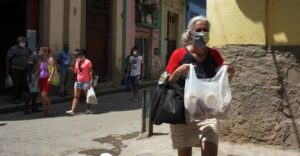By Geoff Thale
When, in May of 2011, WOLA took a delegation to Cuba to look at changes in the Cuban economy and the Cuban workplace, the Party congress had just approved (in principle) the selling of houses by individuals. At the time, it seemed to us and many other observers that this could represent a significant milestone in the ongoing process of economic change in Cuba. (One of the delegation participants was from the construction trades industry; it was fascinating to watch him imagine the home renovation business that would emerge when home owners could buy and sell their own properties, rather than having to go through the complex and cumbersome process of the “permuta”—the process of trading residences.) While many were skeptical about sweeping changes promised by the party congress, even dissident blogger Yoani Sanchez wrote that “when the final report stated that the purchase and sale of houses had been accepted and that it only needed to be legally implemented, hundreds of thousands of Cubans breathed a sign of relief” (translation mine).
Then, a few weeks ago, it was announced that, beginning November 10, 2011, regulations would be in place so that private house sales could begin. While many skeptics, from Barack Obama to Marco Rubio, have expressed doubts about Raul Castro’s commitment to change, the implementation of the home sales rules is an important indication that the current government in Cuba is taking cautious but serious steps to liberalize the Cuban economy.
In fact, these new regulations represent only one aspect of a series of ongoing adjustments in the Cuban economic system (the latest of which allows direct sales of fresh produce from small producers to restaurants in the tourist industry; these restaurants could previously only purchase from state enterprises). None of these changes, by themselves, are transformative. In fact, the Cuban government and the Cuban Communist Party are seeking to modify, rather than replace, their economic system and they are certainly not introducing the kind of shock measures that changed the economies of Eastern Europe overnight. Nonetheless, the steps they are taking appear to be part of a real process of gradual reform, aimed at moving Cuba toward a more mixed economy.
As the University of Havana professor Carlos Alzugaray recently put it, the transformation of the Cuban economy is being carried out "sin prisa pero sin pausa" (without haste but without pause). This description of an economy in a gradual, cautious process of transition coincides with what we saw in Cuba and wrote about on this web site. It is also reflected in a recent report by the Center for Democracy in the Americas, which argues that “today’s reforms are already leading to the emergence of independent economic actors and decentralized decision making over policies that were once strictly in the hands of Havana. These changes are leading some Cubans to say that they feel greater ownership over their lives.”
Some critics—mostly outside Cuba—argue that no change in Cuba is meaningful, unless it is radical change that transforms the society economically and politically overnight. It is certainly important to continue to call on Cuba to expand freedom of speech, freedom of association, and other political rights. It is worth observing, however, that the evidence suggests that what most Cubans want are economic reforms that open possibilities and improve their standard of living and a political system that hears and responds to this demand. At the same time, Cubans would like to preserve the social protections to which they have become accustomed; they aren’t seeking changes that might threaten those protections. So, the Cuban government’s gradualist approach opens it to legitimate criticism that it is not doing enough on the human rights front and reflects the conservatism prevalent among Party leaders (and likely results from the desire of many leaders to maintain their hold on power). But it also seems to reflect the reality that Cubans want both economic reform and continued social protections. (The gradualist approach reflects as well the reality that developing the regulatory capacity to oversee the creation of new markets is an extraordinary challenge for the government apparatus.)
The Cuban authorities are walking a tightrope as they attempt to implement economic reform. This is evident in the complexities of creating a housing market. By only allowing one permanent residence and one vacation home, the government wants to avoid the creation of a speculative market. (Phil Peters has pointed out that the Castro government has created vast new amounts of private capital in the form of home value; this capital means that new markets are being created and that various types of interests will be brought to bear on these new markets.) Enforcing will be difficult, and it is easy to imagine all sorts of ways that people will try to get around the new rules. It is almost certain, for instance, that people with money from Miami relatives will try to buy several houses through front people and then rent out the properties. Thus, the capacity of the Cuban government to implement this rule in a way that is both enforceable and enforced will say a lot about the prospects for a well-managed opening to a more mixed economy in general.
What the Cuban government is doing has been generally well-received by the Cuban people (if anything, popular discontent has forced the changes to proceed at a slower rather than a faster pace). A recent poll by Freedom House noted that Cubans were feeling increasingly optimistic about their future and about the set of changes that the Cuban government is making in the economy. How far the changes will go and to what extent the Cuban government can control the process remain open questions.
While viewing the economic changes as positive and pragmatic, we should recognize that they don’t necessarily or automatically translate into political relaxation or opening. There is certainly a way in which the process of economic liberalization can lead to political de-centralization and open more spaces for local decision-making and public participation. But economic and political opening are not the same thing. (For example, many military leaders in Cuba support market reforms but have a limited commitment to democracy.) Whether initiatives for greater political participation, political competition, and open debate accompany the Cuban government’s steps toward a more mixed economy is something that remains to be seen. (The Cuban Communist Party conference scheduled for early 2012 will discuss some of these issues, and its outcome will give some indication of the trajectory of political change.)
It is important to recognize that the ability of the United States to play a productive role in this process and ensur
e that meaningful democratization accompanies economic liberalization is extremely limited. The U.S. embargo and travel ban, along with counter-productive USAID “democracy promotion" programs, have had the ironic consequence of excluding the United States from the process of real change that is happening in Cuba. (The limits on the United States’ ability to engage constructively with Cuba has forced many analysts to look for alternative approaches that might help integrate Cuba more successfully into the global economy despite the U.S. embargo. For example, some analysts have proposed further engagement with multi-lateral financial institutions, like the World Bank and IMF, a topic which was explored in a recent report by the Brookings Institute.)
Still, there is one avenue for meaningful engagement that remains open to U.S. civil society and government—cultural, academic, and people-to-people exchanges, which can foster trust and mutual understanding even as official diplomatic relations between the United States and Cuba remain stalled. As Cuba’s government continues on its path of pragmatic, cautious reform, these types of exchanges will be increasingly important for U.S. citizens who want to understand what is happening in Cuba and also for civil society actors who want to expand ties between the two countries.
____________


